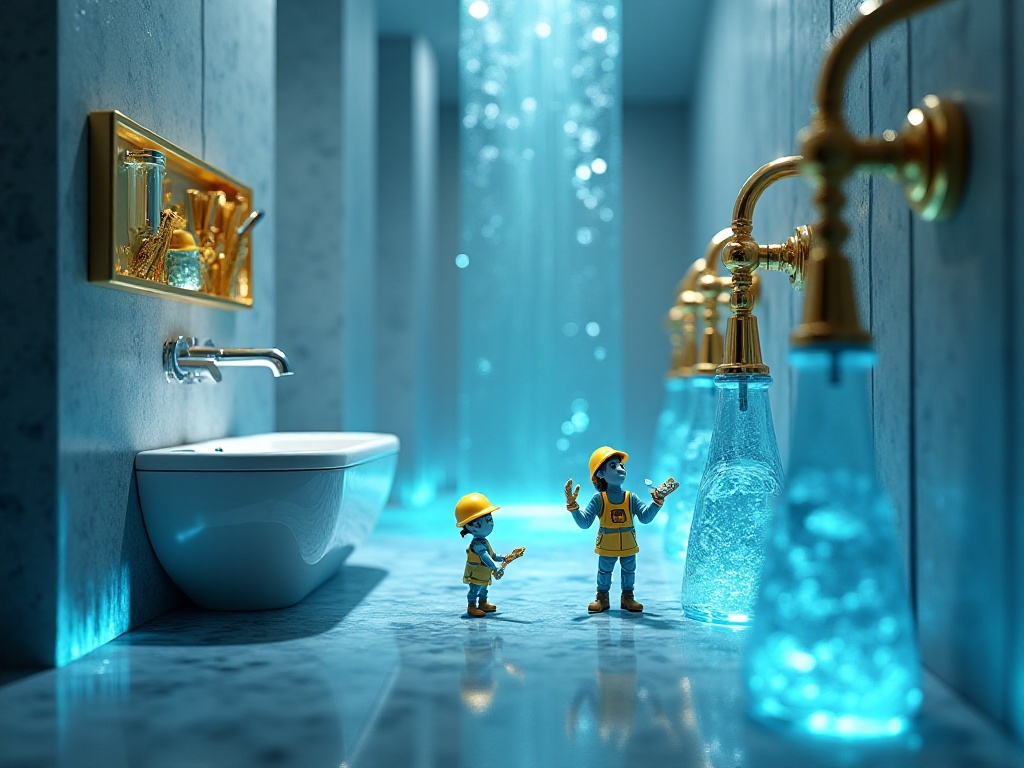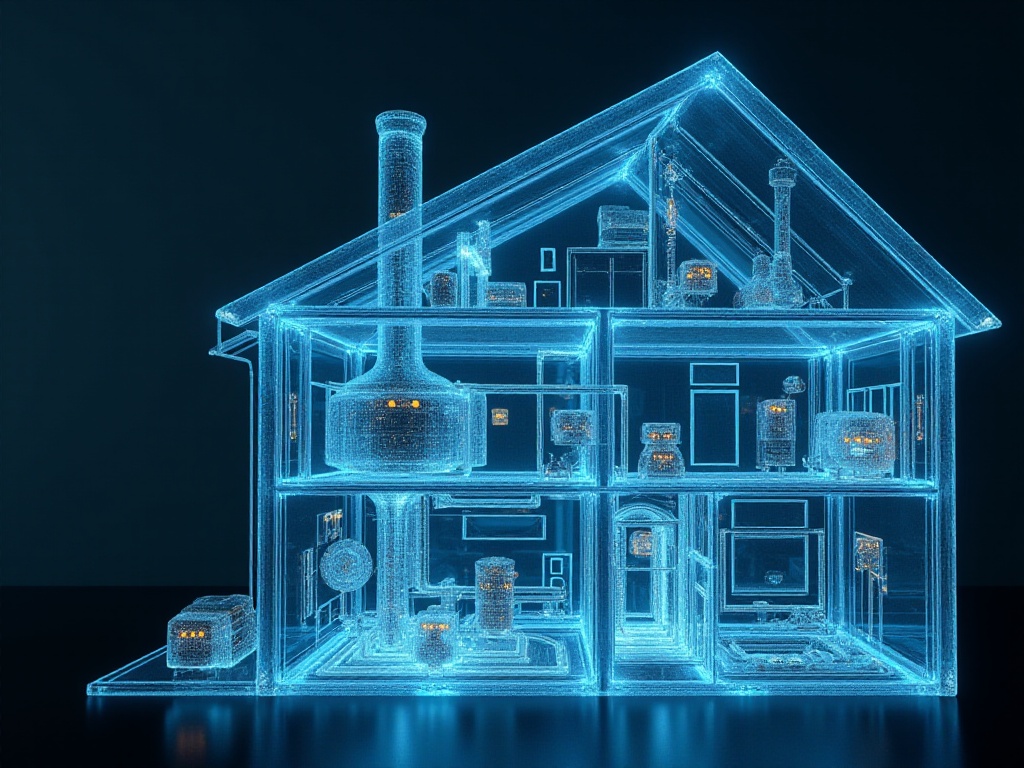Opening Chat
Hey everyone! Today I'm sharing something super practical - home maintenance. Are you often troubled by small issues here and there in your home? Or do you wait until things are completely broken before thinking about repairs? Don't worry, I totally understand this feeling! When I first moved out, I was just like that, which led to my house getting more and more run down. Later, I discovered that just spending half an hour each month following my super simple maintenance plan can keep your home feeling fresh and new forever!
Safety First
When it comes to home maintenance, safety systems are the most important! This is no joke. Last year, my close friend almost had a serious incident because they didn't know their smoke detector was broken, which scared me into taking safety equipment checks very seriously now. So the first thing is to regularly check your home's safety equipment - this is a matter of life and death!
How do you do it? It's super simple! Test your smoke detectors and carbon monoxide detectors at least once a month. The testing method is ridiculously easy - just press the test button and you're done. If you notice the alarm sound isn't right, or it's as quiet as a mosquito, then it's time to change the batteries. I set my testing time to the 1st of each month - I just test them when I get my paycheck, so I never forget.
As for electrical system checks, these are also extremely important. Every three months, you need to give all GFCI outlets a full checkup and inspect all wires for wear and tear. I found the most effective method is setting a reminder on my phone and dedicating a specific weekend to handle these tasks. Since I'm home on weekends anyway, might as well do something meaningful, right?
Also, I strongly recommend keeping fire extinguishers at home, preferably one in each room. You might never use them in your lifetime, but if you ever need one, it's a lifesaver! I now have one in the living room, kitchen, and bedroom. Although they take up space, thinking about the sense of security they provide makes this small sacrifice worthwhile.

Major Systems
Let's talk about the most crucial systems in your home: HVAC, plumbing, and electrical. These are the "heart" of your house, so they need proper care.
First, let's discuss the HVAC system - this is really important! Not cleaning your AC filter regularly is literally burning money. I used to skip filter changes because it seemed like a hassle, and guess what? My electricity bill was almost 30% higher than my neighbor's! That really hurt my wallet, so now I dutifully clean the filters every month, and the results are immediate.
Cleaning AC filters is actually super simple: remove the filter, vacuum off surface dust, wash with warm water, and let it dry. If that seems too troublesome, you can just buy new ones - they're not expensive. But don't think this is optional - dirty filters not only affect cooling efficiency but also worsen indoor air quality, which isn't good for health.
Plumbing system maintenance is also crucial. I've developed a good habit of weekly inspections: checking all faucets for drips and toilets for leaks. Especially in guest bathrooms that aren't used often, I flush the toilet and run the water weekly. Why? Because pipes can develop scale if water doesn't flow for long periods. I learned this the hard way - a guest room that wasn't used for six months had pipes nearly blocked with scale. Getting a plumber to fix it was a real hassle and cost me several hundred dollars!
For the electrical system, besides regular outlet and wire checks, I'm particularly careful about electrical safety. All high-power appliances like AC units and water heaters have dedicated outlets. I've also labeled each outlet with its maximum power rating to prevent accidental misuse.
By the way, never underestimate water leaks. A friend of mine had to pay tens of thousands in damages because a small leak wasn't fixed and water seeped into the apartment below! So now, whenever I notice any signs of leakage, I get it fixed immediately - better to spend a bit more money than leave potential problems.

Daily Maintenance
When it comes to daily maintenance, bathrooms and kitchens - areas that frequently use water - are most easily overlooked. Poor maintenance of these areas not only affects appearance but can also lead to bacterial growth.
The key to bathroom maintenance is preventing mold. Now I use a squeegee to wipe down walls after every shower and run the ventilation fan for at least 30 minutes. While this takes a few extra minutes, it effectively prevents mold growth. Every weekend I wipe the shower head with vinegar water - this trick works great for preventing limescale.
I also installed a smart dehumidifier in the bathroom that automatically runs when humidity exceeds set levels. Though it seemed a bit expensive initially, it's been totally worth it - no more worries about bathroom mold. Plus, the dehumidifier has automatic drainage, so I don't need to worry about emptying it.
Kitchen maintenance is also important, especially cleaning appliances. The refrigerator needs to be pulled out every three months to clean dust from behind it, otherwise cooling efficiency decreases and electricity usage soars. I now combine this with seasonal deep cleaning to handle everything at once.
I have a special method for cleaning the microwave: pour two cups of water and two tablespoons of white vinegar in a large bowl, heat on high for 5 minutes. Once the steam softens all the grease inside, just wipe it down - super easy to clean. This method is both eco-friendly and effortless.
Range hood cleaning is the most challenging, but I've developed a system. First, soak removable parts in hot water with specialized cleaner for 20 minutes. Then gently scrub with a soft brush and rinse with clean water. Though it's a bit troublesome, doing it monthly keeps the range hood clean.
Cabinet maintenance shouldn't be ignored either. My cabinets are wooden, and I apply specialized furniture oil every three months to prevent cracking and maintain shine. Hinges also need regular oiling to prevent rust and annoying squeaking sounds.

Seasonal Care
Each season requires different home maintenance focus, which really needs to be planned according to weather changes.
Spring is the best time for deep cleaning. This is when you should focus on checking the roof and drainage systems for any winter damage. I observe the roof during spring rains to spot any leaks. Fixing problems promptly prevents bigger issues during the rainy season.
Summer focuses on cooling system maintenance. Besides regular AC filter cleaning, I check that the outdoor unit is securely installed and that nothing blocks its ventilation. Summer is also crucial for dehumidification. I place dehumidifier boxes in prone-to-moisture areas and replace them regularly to effectively prevent mold.
Fall is about preparing for winter. This includes checking door and window seals, replacing gaskets where needed, and adding draft stoppers. This not only keeps warmth in but saves on electricity. Just replacing a few door and window seals last year significantly reduced my winter heating bills.
Gardening maintenance also follows seasonal patterns. Lawns need weekly mowing during growing season, but don't cut too short. I made this mistake before, cutting the lawn too low, and it went bare in the summer heat - heartbreaking. Now I maintain a 3-4 cm height, and the lawn looks beautiful.
Winter focuses on freeze prevention. All outdoor pipes need insulation, especially water meter boxes - they must be well-wrapped with insulation cotton. Last year my neighbor's water meter burst from freezing, and they had to find someone to fix it in the middle of the night - what a hassle!

Tips from Experience
Finally, here are some super useful tips I've tried:
Squeaky furniture driving you crazy? No need to rush to replace it - try rubbing some candle wax on the joints, and the noise disappears instantly. This trick saves money and effort - worked great on my wooden chairs.
Small hole in the wall? Don't panic - mix baking soda with white glue into a paste, fill the hole, and once dry, spray some wall paint - it'll be invisible. I've done this repair several times with great results.
Clogged pipes don't always need a plumber right away. Try a plunger first - it solves most issues. If that doesn't work, try a combination of baking soda and vinegar, wait 15 minutes, then flush with hot water - usually clears the clog.
Here's a recent cleaning discovery: soak lemon slices in vinegar for a week - this solution is amazing for cleaning, especially limescale, with fantastic results! And no worries about chemical cleaner safety.
I've made maintenance checklists for each room, posted in discrete locations. They list regular maintenance items and schedules for that room, so nothing gets missed. For example, the bathroom checklist includes mold prevention, ventilation, pipe checks, etc. - checking items off gives a sense of accomplishment.
Remember to prepare a toolbox with basic tools: screwdrivers, wrenches, pliers, hammers - you need all these. I used to have to borrow tools for simple repairs, which was really inconvenient. Now my toolbox stays in the storage room, ready whenever needed.
One last tip: record all maintenance work. I created a spreadsheet to track maintenance times, tasks, and costs. This helps me better plan maintenance schedules and track annual maintenance expenses.
After all this, the most important aspect of home maintenance is developing habits - regular checks and prompt problem-solving. Stick with it, and you'll find your home always stays fresh and comfortable to live in.
By the way, do you have any unique home maintenance tricks? Feel free to share in the comments - maybe I'll learn something new too!




